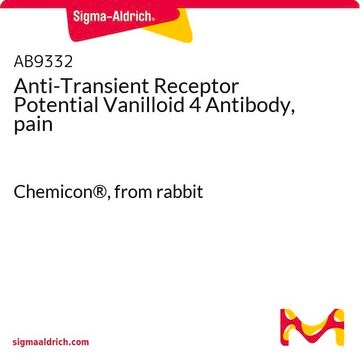一般說明
We are committed to bringing you greener alternative products, which adhere to one or more of the 12 Principles of Green Chemistry. This antibody is preservative-free, produced without the harm or sacrifice of animals and exceptionally stable to allow for ambient shipping and storage if needed, and thus aligns with "Waste Prevention", "Designing Safer Chemicals" and "Design for Energy Efficiency".
Click here for more information.
ZooMAb® antibodies represent an entirely new generation of recombinant monoclonal antibodies. Each ZooMAb® antibody is manufactured using our proprietary recombinant expression system, purified to homogeneity, and precisely dispensed to produce robust and highly reproducible lot-to-lot consistency. Only top-performing clones are released for use by researchers. Each antibody is validated for high specificity and affinity across multiple applications, including its most commonly used application. ZooMAb® antibodies are reliably available and ready to ship when you need them.
特異性
Clone 1I9 is a ZooMAb® rabbit recombinant monoclonal antibody that specifically detects Aldo-keto reductase family 1 member C3 (AKR1C3). It targets an epitope within 15 amino acids from the internal region.
免疫原
KLH-conjugated linear peptide corresponding to 15 amino acids from the internal region of human Aldo-keto reductase family 1 member C3 (AKR1C3).
應用
Quality Control Testing
Evaluated by Western Blotting in A549 cell lysate.
Western Blotting Analysis: 1:1,000 dilution of this antibody detected AKR1C3 in A549 cell lysate.
Tested Applications
Western Blotting Analysis: 1:1,000 dilution from a representative lot detected AKR1C3 in lysates from HepG2 cells and Human small intestine tissue.
Immunohistochemistry (Paraffin) Analysis: A 1:100 dilution from a representative lot detected AKR1C3 in Human small intestine tissue sections.
Flow Cytometry Analysis: 0.1 µg from a representative lot detected AKR1C3 in one million A549 cells.
Immunocytochemistry Analysis: A 1:100 dilution from a representative lot detected AKR1C3 in HepG2 cells.
Affinity Binding Assay: A representative lot of this antibody bound AKR1C3 peptide with a KD of 6.0 x 10-7 in an affinity binding assay.
Note: Actual optimal working dilutions must be determined by end user as specimens, and experimental conditions may vary with the end user.
標靶描述
Aldo-keto reductase family 1 member C3 (UniProt: P42330; also known as EC:1.1.1.210, 17-beta-hydroxysteroid dehydrogenase type 5, 17-beta-HSD 5, 3-alpha-HSD type II brain, 3-alpha-hydroxysteroid dehydrogenase type 2, 3-alpha-HSD type 2, Chlordecone reductase homolog HAKRb, Dihydrodiol dehydrogenase 3, DD-3, DD3, Dihydrodiol dehydrogenase type I, HA1753, Prostaglandin F synthase 1, PGFS, Testosterone 17-beta-dehydrogenase 5) is encoded by the AKR1C3 (also known as DDH1, HSD17B5, KIAA0119, PGFS) gene (Gene ID: 8644) in human. AKR1C3 is a cytosolic aldo-keto reductase that catalyzes the NADH and NADPH-dependent reduction of ketosteroids to hydroxysteroids. Its expression is observed in many tissues with higher expression observed in prostate tissue and mammary glands. It acts as a NAD(P)(H)-dependent 3-, 17- and 20-ketosteroid reductase on the steroid nucleus and side chain and regulates the metabolism of androgens, estrogen, and progesterone. It displays the ability to catalyze both oxidation and reduction in vitro, but most probably acts as a reductase in vivo since the oxidase activity measured in vitro is inhibited by physiological concentration of NADPH. It is reported to reduce prostaglandin (PG) D2 to 11-β-prostaglandin F2; progesterone to 20- -hydroxyprogesterone; and estrone to 17-β-estradiol. Its activity is strongly inhibited by non-steroidal anti-inflammatory drugs (NSAID) and by low concentrations of NADPH. Two isoforms of AKR1C3 have been described that are produced by alternative splicing. This ZooMAb® recombinant monoclonal antibody, generated by our propriety technology, offers significantly enhanced specificity, affinity, reproducibility, and stability over conventional monoclonals. (Ref.: Kabututu, Z., et al. (2009). J. Biochem.145(2):161-168; Steckelbroeck, S., et al. (2004). J. Biol. Chem. 279(11); 10784-10795).
外觀
Purified recombinant rabbit monoclonal antibody IgG, lyophilized in PBS with 5% Trehalose, normal appearance a coarse or translucent resin. The PBS/trehalose components in the ZooMAb formulation can have the appearance of a semi-solid (bead like gel) after lyophilization. This is a normal phenomenon. Please follow the recommended reconstitution procedure in the data sheet to dissolve the semi-solid, bead-like, gel-appearing material. The resulting antibody solution is completely stable and functional as proven by full functional testing. Contains no biocide or preservatives, such as azide, or any animal by-products. Larger pack sizes provided as multiples of 25 µL.
重構
30 µg/mL after reconstitution at 25 µL per vial. Please refer to guidance on suggested starting dilutions and/or titers per application and sample type.
儲存和穩定性
Recommend storage of lyophilized product at 2-8°C; Before reconstitution, micro-centrifuge vials briefly to spin down material to bottom of the vial; Reconstitute each vial by adding 25 µL of filtered lab grade water or PBS; Reconstituted antibodies can be stored at 2-8°C, or -20°C for long term storage. Avoid repeated freeze-thaws.
法律資訊
ZooMAb is a registered trademark of Merck KGaA, Darmstadt, Germany
免責聲明
Unless otherwise stated in our catalog or other company documentation accompanying the product(s), our products are intended for research use only and are not to be used for any other purpose, which includes but is not limited to, unauthorized commercial uses, in vitro diagnostic uses, ex vivo or in vivo therapeutic uses or any type of consumption or application to humans or animals.









